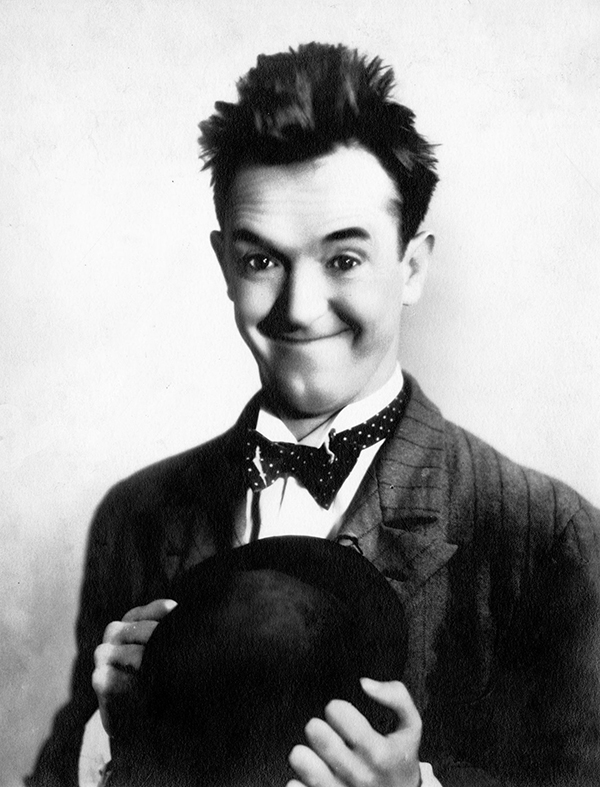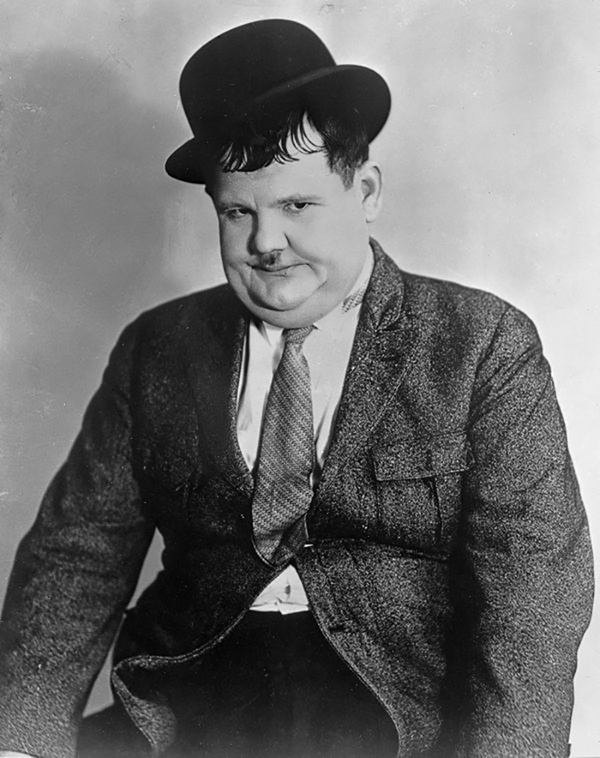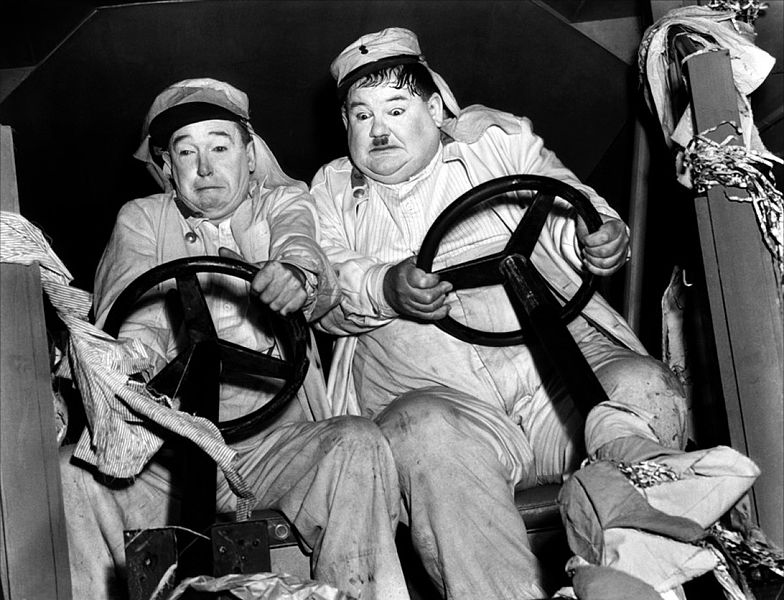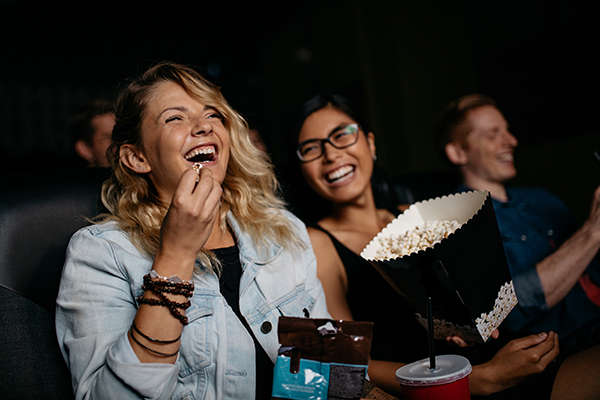Cinema History: Laurel and Hardy
An overview of cinema history could never be complete without delving into the careers of Stan Laurel and Oliver Hardy, otherwise known simply as Laurel and Hardy. This comedy duo claims top honors on many lists, and for good reason. Both comedians began successful solo stage and theater careers before teaming up as an act to make numerous movies over a span of 25 years. Together, the slapstick duo created comedy magic that delighted fans of all ages.

Stan Laurel
Stan Laurel’s birth name was Arthur Stanley Jefferson, and he was born on June 16, 1890, in northern England. Raised in a theatrical family, Laurel was exposed to the theater through his actor parents. Initially, Laurel wanted to be a music hall comedian, and he was known to play hooky from school so he could attend the theater. In 1910, Laurel was invited to join a traveling comedy troupe, and he became a Charlie Chaplin understudy. As his career gradually expanded to motion pictures over the next decade, he changed his name to Stan Laurel in 1919. Several short movies followed over the next few years, one even causing him to cross paths with Oliver Hardy. In 1924, Laurel earned a contract with Joe Rock for 12 comedy shorts. When this contract ended, Laurel was hired as a writer and director by Hal Roach. He even directed a movie that starred Hardy. In 1926, Laurel earned a part with the Hal Roach All-Stars, and he began receiving performing roles in productions. It was during this time that Laurel and Hardy began performing scenes together, and their combined comic spark was discovered. Their first film together as a team was Putting Pants on Philip.

Photo by Stax / Public domain
Oliver Hardy
Oliver Hardy was born Norvell Hardy on Jan. 18, 1892, in Harlem, Georgia. After his father died early on, Hardy was raised by his mother. He preferred the stage and local minstrel shows to his schoolwork, and he showed talent as a singer. When he was 18, he began managing a local movie theater, and it was then that he fell in love with the new motion picture medium. He adopted the stage name of Oliver as a tribute to his late father, and he began calling himself Oliver Norvell Hardy. He advanced his career by working as a vaudeville singer and working in comic shorts. He worked extensively in silent movies for several Hollywood movie companies, including an appearance in Lucky Dog in 1921 with Stan Laurel. Hardy signed with Hal Roach Studios in 1924, and it was then that the two actors met again and the spark was lit. The two men shared scenes together intermittently, but they weren’t teamed together deliberately for a few more years.

Laurel and Hardy
Part of the charm of Laurel and Hardy was the simplicity of their humor. Virtually everyone could relate to their comedy skits, and the humor was successful in crossing many different barriers. Laurel and Hardy made more than 100 movies as a team between 1926 and 1951. The years prior to 1940 were arguably their finest, thanks to the freedom they enjoyed working with Hal Roach Studios. Laurel and Hardy successfully transitioned from silent short movies to “talkies,” which necessitated a slower pace than silent slapstick comedy needed. The Music Box won an Oscar for Best Live Action Short Subject in 1932, the only Academy Award Laurel and Hardy ever won. Feature-length comedies were next for Laurel and Hardy, including classics like Sons of the Desert and Babes in Toyland.
The final decade of their film careers was marked with less freedom and spontaneity, which had an effect on the films produced during this time. The comedy duo left Hal Roach Studios in 1940, then joined up with 20th Century Fox and MGM. Instead of enjoying A-list status with these studios, they were relegated to the B-list and weren’t allowed to contribute to scripts or improvise during filming. Their final American film was The Bullfighters in 1945, and their final movie as a team was Atoll K in 1951. At that point, both Laurel and Hardy were suffering health problems, and their last film was not successful. Oliver Hardy had a heart attack in 1954 and then several strokes that left him infirm. He died in 1957 at the age of 65. Laurel also suffered a stroke, and he was unable to go to Hardy’s funeral because of his health. Laurel never made another public appearance from this point on, and he died in 1965 of a heart attack at the age of 75.

film screenshot (RKO) / Public domain
Influence on Comedy

Laurel and Hardy were influential in the world of comedy in several ways. First, they pioneered the concept of the comedy duo as they integrated slapstick comedy into their productions. Slapstick comedy was born during the silent film era, and it is known for having a broad appeal with its predominantly visual action, horseplay, and harmless gags and violence. Actors had to have perfect timing and exceptional acting skills to excel at slapstick. Gradually, slapstick comedy evolved into screwball comedy. This genre features crazy, ridiculous, and eccentric actions and behaviors with witty dialogue and lots of outwitting and maneuvering between characters. Plots were fast-paced, and one-liners flew rapidly in these productions. Laurel and Hardy’s contributions on the silver screen made way for the antics found in many television sitcoms decades later.
- A Tribute to Oliver Hardy
- Another Fine Mess: Silent Laurel and Hardy Shorts
- Stan Laurel
- Comedy and Tragedy
- Laurel and Hardy Magazine
- Laurel and Hardy: The Official Website
- Stan Laurel
- Stan Laurel’s Life in Laughter
- Laurel and Hardy Biography
- Oliver Hardy’s Georgia Roots
- Comedy Films
- Comedy’s Evolution: Make ‘Em Laugh
- What Is Slapstick Comedy?
- Laurel and Hardy
- The True Story of Stan and Ollie
- What to Know About Laurel and Hardy
- Another Fine Mess: The Real Story of Their Final Days
- Stan and Ollie: The Story of Laurel and Hardy’s Final Tour
- Meetings That Made History: When Laurel Met Hardy
- From the Archives: Film Comic Stan Laurel Dies at 74
- Laurel and Hardy: Hollywood’s Greatest Friendship
- Another Nice Mess: Reflecting on Laurel and Hardy
- Laurel and Hardy From the Forties Forward
- The Love Affairs of Stan Laurel: “If I Had to Do it Over Again, Things Would Be Different”
Home Theater Seating
- Sligthly Curved Theater Seating
- One Home Theater Chair
- Low Sitting Theater Recliner Seats
- Commercial Grade Recliners
- Theater Seating Chaise
- Elevated Back Row For Home Theatre Seating
- Automatic Theater Recliners For Sale
- Theater Seating Zero Clearance
- Non Leather Movie Chairs
- Upscale Theater Chairs
- Recliner Seats
- Medium Size Sectional Couch
- Powered Recliners On Sale
- Leather Recliner Chairs Recliners
- Theater Seats.Com
- Chairs Movies
- Best Reclining Furniture
Brands, Decor & Accessories
- Wood And Leather Recliner Chair
- Diamond Theater Chairs
- Black Italian Leather
- Azure Color Chairs
- Leather Theater Seating Navy
- Dark Grey Theater Seats
- Red Leather Power Theater Seat Adjustable
- Bonus Room Theater Ideas
- Recliner Cup Holder Lights
- Home Movie Theater Movie Memorabilia
- Most Preferred Massage Couches
- White Leather Power Recliner Sofa
- Octane Turbo Xs400 4 Seater
- Theater Seat Accessories
- Berkline Leather Theater Chairs
Top Pages
- Theatre Room Cost
- Compact Leather Recliner
- Modern Recliners With Lights
- Xl Power Recliner Chair With Lumbar Support
- Leather Chairs For Movie Watching
- Pwr Recliner Adj Headrest
- Tv Room Furniture Layout
- Black Double Recliners
- Big Person Recliner Over 400
- Small Footprint Recliners
- Large Reclining Sectional Sofas
- Leather Loveseat Modern
- Black Recliner Theater Chair
- 16K Resolution
- Couch With Long Seat

